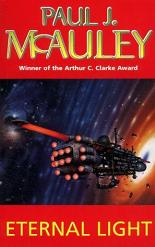Eternal Light is a good example of late eighties, early nineties New Space Opera. If you're a science fiction reader, you know space opera is a subgenre invented in the 1920ties, largely by E. E. "Doc" Smith, in which square jawed heroes fight diabolical villains throughout the Galaxy (and beyond) for the fate of the universe. It's always been popular with readers but looked down upon by "serious" science fiction fans and critics. Though Smith always remained popular, space opera slowly died out, especially after the New Wave transformed science fiction. There were some attempts to revive it in the seventies, but as exercises in nostalgia they had only a limited appeal. Something changed in the eighties though: a new generation of writers had appeared who missed the hangups of their predecessors. People like Gregory Benford, David Brin, Greg Bear, Stephen Baxter and especially Iain M. Banks went eagerly for the large canvas space opera offers. In their hands space opera became one of the staples of science fiction again, combining the sense of wonder of the old space opera with more realistic science and complex plots and characters. Gone were the cardboard heroes and villains and space opera was the better for it.
McAuley was one of the writers recreating space opera, first with his debut novel Four Hundred Billion Stars, which won the Philip K. Dick Memorial Award, then with its sequel, Eternal Light. Now I haven't read the first book, though I've now read Eternal Light three times, with little trouble. Though it's very noticable that this is a sequel --little asides here and there, back references, characters introduced as if you should already know them-- it's not to such an extent that it is impossible to read without its predecessor. Well, I certainly enjoyed it.
Eternal Light is set in the aftermath in Earth's first war against an alien species, the Alea, who had fled the Galactic Core half a million years ago to escape the wrath of the Marauders (an Alea family on wiping out every other Alea) and who mistook humanity for them. Dorthy Yashinda played a pivotal role in this war, using her psychic Talent and for her trouble now has an Alea Female living in her brain. These long lived females are the only intellignet members of Alea families, the others living as non-intelligent animals. Thanks to her unwelcome guest, Yashinda is in the care of the ReUnited Nations Navy, until kidnapped from under their noses by the Golden Talbeck. Talbeck needs her for his (illegal) expedition to a very peculiar star, one that is moving at six percent of light speed towards the Solar System and even stranger, which still has a planet, a gas giant, with one moon, in orbit around it. this star is suspected of being an Alea weapon and Talbeck wants to invesitgate it for himself.
Meanwhile, on Titan, Talbeck has also recruited Suzy Falcon, a Singleship combat veteran, for his expedition. She has to escape from Titan once the plot becomes known and does so with the help of Robot/Machine, an artist who has upgraded his brain with computer machinery. They follow Talbeck's ship to the runaway star were there is already a RUN navy expedition... Though the star is interesting in itself, the moon orbiting its single planet is much more interesting, as that holds what look like a great many wormholes...
It's from this point that Eternal Light takes a turn to the metaphysical and raises the curtains on the universe's secret history, so to speak. That history is revealed to stretch back billions of years and involve far more than the pedestrian conflicts of both humans and the Alea. Its revelation is one of those moments in science fiction where, if you're sensitive to this sort of thing, you can feel a genuine sense of wonder, so I'd rather not spoil it for you. It works so well just because McAuley has it grounded in the much more down to earth concerns of his main characters and the realpolitics surrounding them.
Unfortunately, once the climax has been achieved and the secret history revealed, the book goes on, with Dorthy Yashinda going back to earth for an epilogue that is largely unnecessary in my opinion. Instead of ending on a high, you get a gradual and boring climbdown, which I found a chore to finish. It doesn't help that the villains in this part of the book are so twodimensionally awful. I'd suggest if you're goint to read Eternal Light, to skip part four.
Despite this disappointing ending, Eternal Light is a worthwhile, entertaining read, even though it holds to one of my pet peeves, that mathematics, a way of describing reality, is a higher reality than the physical world. The first time I read that I nearly threw the book against the wall; these days the concept is not so new to me anymore. I still disagree with it, but it's not enough to put me off a novel as good as this. This review only showed the tip of the iceberg; McAuley has created a complex, living future in Eternal Light that rewards careful reading.
Read more about:
Paul J. McAuley,
Eternal Light,
science fiction,
book review

